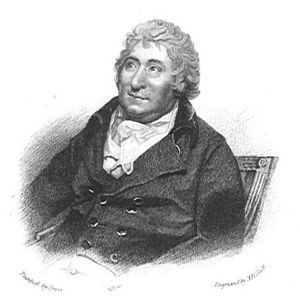Annotation:Jack at Greenwich: Difference between revisions
No edit summary |
Alan Snyder (talk | contribs) (Fix HTML, citation) |
||
| Line 2: | Line 2: | ||
---- | ---- | ||
<p><font face="garamond, serif" size="4"> | <p><font face="garamond, serif" size="4"> | ||
'''JACK AT GREENWICH.''' English, Air (whole time). A Major. Standard tuning (fiddle). One part. The song "Jack at Greenwich" was written by Charles Dibdin [https://en.wikipedia.org/wiki/Charles_Dibdin] ( | '''JACK AT GREENWICH.''' English, Air (whole time). A Major. Standard tuning (fiddle). One part. The song "Jack at Greenwich" was written by Charles Dibdin [https://en.wikipedia.org/wiki/Charles_Dibdin] (1745–1814), a popular and prolific songwriter renowned for his sea songs. The first stanza of the song (which tells of Jack's gradual disablements) goes: | ||
< | </font></p> | ||
''We tars are all for fun and glee, | [[File:dibdin.jpg|300px|thumb|right|Charles Dibdin]] | ||
<blockquote><font face="garamond, serif" size="4"><i> | |||
''We tars are all for fun and glee,—''<br> | |||
''A hornpipe was my notion;''<br> | ''A hornpipe was my notion;''<br> | ||
''Time was I'd dance with any he''<br> | ''Time was I'd dance with any he''<br> | ||
| Line 16: | Line 18: | ||
''A splinter queer'd my larboard gam,''<br> | ''A splinter queer'd my larboard gam,''<br> | ||
''And, damme! spoil'd my dancing.''<br> | ''And, damme! spoil'd my dancing.''<br> | ||
</blockquote> | </i></font></blockquote> | ||
<p><font face="garamond, serif" size="4"> | |||
The song was written for Dibdin's three act entertainment '''The Cake-House''', produced in 1800. | The song was written for Dibdin's three act entertainment '''The Cake-House''', produced in 1800. | ||
<br> | <br> | ||
| Line 27: | Line 30: | ||
</font></p> | </font></p> | ||
<p><font face="garamond, serif" size="4"> | <p><font face="garamond, serif" size="4"> | ||
''Printed sources'': Dibdin & Hogarth ('''The Songs of Charles Dibdin | ''Printed sources'': | ||
Dibdin & Hogarth ('''The Songs of Charles Dibdin'''), 1848; pp. 253–255. | |||
Manson ('''Hamilton's Universal Tune-Book, vol. 2'''), 1846; p. 15. | |||
<br> | <br> | ||
<br> | <br> | ||
</font></p> | </font></p> | ||
<p><font face="garamond, serif" size="4"> | <p><font face="garamond, serif" size="4"> | ||
''Recorded sources'': <font color=teal>Tundra | ''Recorded sources'': | ||
<font color=teal> | |||
Tundra – "Songs from Greenwich." | |||
</font> | |||
</font></p> | </font></p> | ||
<br> | <br> | ||
<br> | <br style="clear:both"/> | ||
---- | ---- | ||
=='''Back to [[{{BASEPAGENAME}}]]'''== | =='''Back to [[{{BASEPAGENAME}}]]'''== | ||
Revision as of 04:57, 26 February 2017
Back to Jack at Greenwich
JACK AT GREENWICH. English, Air (whole time). A Major. Standard tuning (fiddle). One part. The song "Jack at Greenwich" was written by Charles Dibdin [1] (1745–1814), a popular and prolific songwriter renowned for his sea songs. The first stanza of the song (which tells of Jack's gradual disablements) goes:

We tars are all for fun and glee,—
A hornpipe was my notion;
Time was I'd dance with any he
That sails the salt sea ocean:
I'd tip the roll, the slide, the reel,
Back, forward, in the middle;
And roast the pig, and toe and heel,
All going with the fiddle.
But one day told a shot to ram,
To chase for foe advancing,
A splinter queer'd my larboard gam,
And, damme! spoil'd my dancing.
The song was written for Dibdin's three act entertainment The Cake-House, produced in 1800.
Source for notated version:
Printed sources:
Dibdin & Hogarth (The Songs of Charles Dibdin), 1848; pp. 253–255.
Manson (Hamilton's Universal Tune-Book, vol. 2), 1846; p. 15.
Recorded sources: Tundra – "Songs from Greenwich."
